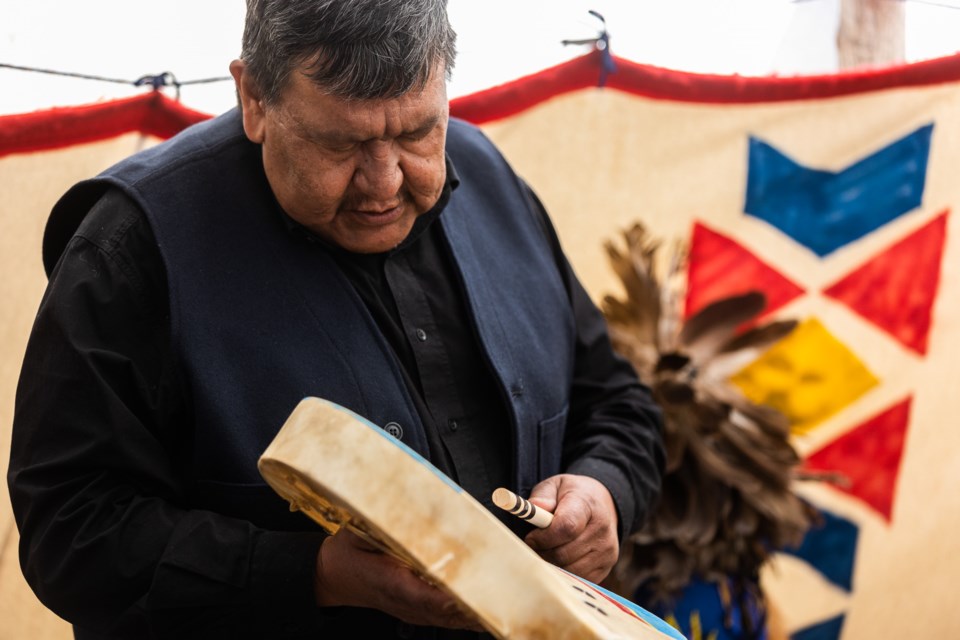For Eden Valley resident Keith Lefthand, it's a single step in the right direction.
“I would like to see more people from our local towns and even the city to learn more about First Nations people, who we are, and our beliefs,” Lefthand said.
In an effort to help normalize Indigenous culture among non-Indigenous Canadians, Lefthand invited visitors to his home on the Eden Valley Reserve, which is a part of the Stoney-Nakoda First Nation, predominantly inhabited by members of the Bearspaw Band.
He began an Oct. 1 session in a teepee by his home, explaining and demonstrating practices of his people, including smudging and a prayer.
What followed was Lefthand describing his culture, his life in Eden Valley, the challenges that came with it, and what his family and people had endured at the hands of the government.
While Lefthand said in the session he did not endure residential schools, he witnessed firsthand the effect it had on people, with his mother and her siblings having survived them.
“What residential school was, was a hurt put upon our people,” Lefthand said in the session. “The government stood there and watched.
“They said we were savages, they wanted to turn us into these other people so we could fit into society. That’s what their plan was, that’s what they said.
“But we had governed ourselves for thousands of years, on how to live with the land. We were humble people back then. We had our own leaders, we had our own beliefs with the creator.”
Through the information sessions, he hopes to educate outsiders in his peoples’ way of life and break stereotypes.
“We need to get rid of that so our kids feel comfortable going outside the reserve and don’t run into racism,” Lefthand said.
The father and grandfather recalled the racism his sons had endured in their youth from opposing players in minor hockey.
“Those are the things I want to see gone, that’s why I’ve started these cultural awareness days,” he continued.
Quality of life on the reserve has been improving, but still presents many barriers that Lefthand, a former band councillor over several terms, wants to help fix.
“We’re moving toward the right direction, taking the right steps,” he said. “Overall, our Chief (Darcy Dixon) worked very hard. He’s been there a long time now.”
Eden Valley is home to approximately 700 people, with around 100 homes.
“That is our other problem, we’re overcrowded in homes,” Lefthand said.
Under the Indian Act, those homes belong to the tribe, not the inhabitants, whereas in the tribe’s eyes, it’s his home.
This creates a barrier for Indigenous people to access funding to get a loan, as they technically have no collateral.
Those homes, he added, are not connected to a water source.
While a new water treatment plant came online in recent years, the water still has to be trucked out to homes, which use cisterns.
“During the summer, when we had everyone (Lefthand’s family) back, there were two days we were out,” Lefthand said.
That water may still not be completely safe either.
“The recommendations we got from the health centre was even though it’s from the treatment plant, they advised us to boil it to drink it,” he said.
A major barrier to prosperity on the reserve is employment and education.
“It’s almost impossible to employ everybody, there’s just not enough jobs,” Lefthand said.
Education on the reserve is sorely lacking in resources and funding, he added, and he would like to see more support from the government.
“They say they’re looking after us, but it’s very little, just enough to pay teachers,” Lefthand said.
“Our education system needs to improve here on the reserve. Education is very important and the system we have here is not what it takes to go to post-secondary education after high school.”
Support for further skills training would also help improve conditions.
“People could have a career, learn more about carpentry, or be an electrician—we don’t have our own electrician,” Lefthand said.
“We need education. Once you have resources, I think we can do more things to educate our adults.”
For more information on possible future information events with Keith Lefthand, visit weaseltail.com.




